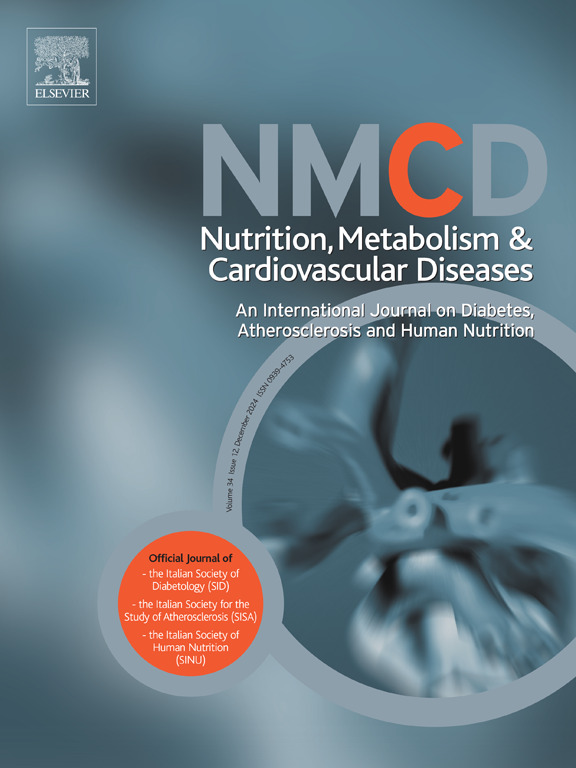Association between hedonic hunger and food addiction: A systematic review and meta-analysis
IF 3.3
3区 医学
Q2 CARDIAC & CARDIOVASCULAR SYSTEMS
Nutrition Metabolism and Cardiovascular Diseases
Pub Date : 2025-02-01
DOI:10.1016/j.numecd.2025.103900
引用次数: 0
Abstract
Aims
In recent years, food addiction has gained significant interest from the scientific community. Hedonic hunger has been identified as a crucial risk factor contributing to food addiction. Therefore, this systematic review and meta-analysis aim to consolidate the current evidence regarding the relationship between hedonic hunger and food addiction among healthy individuals.
Data synthesis
A comprehensive search was conducted across three databases - PubMed, Web of Science, and Scopus - up to October 2024. The review included all original observational studies published in English that utilized the Power of Food Scale (PFS) to measure hedonic hunger and the Yale Food Addiction Scale (YFAS) along with its derivatives to evaluate food addiction in healthy participants. The quality of the studies was assessed using the Joanna Briggs Institute checklist. The meta-analysis was performed using StataMP-17 software. Following the screening process, seven cross-sectional studies comprising a total of 2518 participants were included. The findings from the meta-analysis revealed a positive and statistically significant correlation between the score of PFS and the score of YFAS (r = 0.53, 95 % CI: 0.35, 0.71). Furthermore, the meta-regression analysis indicated that the percentage of female participants and sample size did not significantly affect the relationship between hedonic hunger and food addiction.
Conclusions
Given the established positive association, it may be advantageous to consider the impact of hedonic hunger in strategies aimed at managing food addiction.
享乐性饥饿与食物成瘾之间的关系:一项系统综述和荟萃分析。
目的:近年来,食物成瘾引起了科学界的极大兴趣。享乐性饥饿已被确定为导致食物成瘾的关键风险因素。因此,本系统综述和荟萃分析旨在巩固健康个体中享乐性饥饿与食物成瘾之间关系的现有证据。数据综合:对三个数据库(PubMed、Web of Science和Scopus)进行了全面的搜索,截止到2024年10月。这篇综述包括了所有用英语发表的原始观察性研究,这些研究使用食物力量量表(PFS)来测量享乐性饥饿,使用耶鲁食物成瘾量表(YFAS)及其衍生物来评估健康参与者的食物成瘾。研究的质量是用乔安娜布里格斯研究所的检查表来评估的。meta分析采用StataMP-17软件进行。在筛选过程之后,包括2518名参与者在内的7项横断面研究被纳入。meta分析结果显示,PFS评分与YFAS评分呈正相关且有统计学意义(r = 0.53, 95% CI: 0.35, 0.71)。此外,meta回归分析表明,女性参与者的比例和样本量对享乐饥饿和食物成瘾的关系没有显著影响。结论:鉴于已建立的正相关关系,在控制食物成瘾的策略中考虑享乐饥饿的影响可能是有利的。
本文章由计算机程序翻译,如有差异,请以英文原文为准。
求助全文
约1分钟内获得全文
求助全文
来源期刊
CiteScore
6.80
自引率
2.60%
发文量
332
审稿时长
57 days
期刊介绍:
Nutrition, Metabolism & Cardiovascular Diseases is a forum designed to focus on the powerful interplay between nutritional and metabolic alterations, and cardiovascular disorders. It aims to be a highly qualified tool to help refine strategies against the nutrition-related epidemics of metabolic and cardiovascular diseases. By presenting original clinical and experimental findings, it introduces readers and authors into a rapidly developing area of clinical and preventive medicine, including also vascular biology. Of particular concern are the origins, the mechanisms and the means to prevent and control diabetes, atherosclerosis, hypertension, and other nutrition-related diseases.

 求助内容:
求助内容: 应助结果提醒方式:
应助结果提醒方式:


